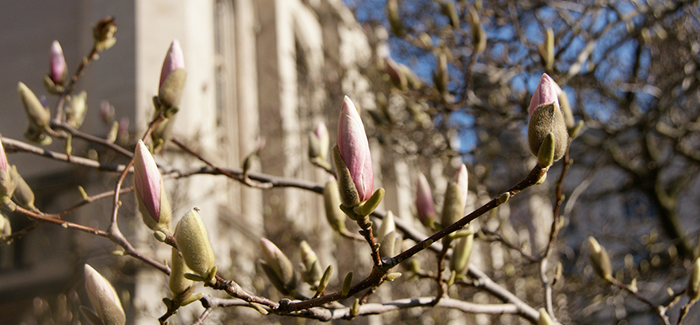
(Photography by Romana Klee, CC BY-SA 2.0)
The sounds of March.
“And the riverbank talks of the waters of March, It’s the promise of life, it’s the joy in your heart.”
More than any other pairing of months in the Magazine’s production cycle, March–April contains a turn, and the possibility of extremes. March, the month of lions and lambs, itself a fickle changeling; April, the month (we hope) of sweet showers heralding, if not bringing, spring blooms. As a March baby, I’ve always had a soft spot for this most mercurial time of the year, and an extra measure of patience with it. The day I was born, the vernal equinox arrived as the season’s biggest snowstorm closed in.
What will this March bring? A few things we can count on: basketball, Irish pride, paczki for us Polish Americans. Also, the last couple of weeks of winter quarter, exams, spring break, and, at the very tail end, a fresh, clean page: the first day of spring quarter on the last day of the month. “In like a lion, out like a lamb” maps neatly onto the academic calendar. The stress won’t kick in again until at least April 1, right?
In the opening lines of The Canterbury Tales, Chaucer mentions the drought of March in passing, less concerned with it than with the more reliably springlike April that redeems it. But as far as I’m concerned, March is the only month that comes with a ready-made soundtrack, one that turns Chaucer’s description on its head: the most wonderful of all bossa nova songs, Antonio Carlos Jobim’s “Águas de Março” or “Waters of March.”
March is a chameleon, so it’s fitting that perhaps the best-known popular song about it should have both spring and fall versions. Originally written in Portuguese, “Waters of March” pays tribute to the rainy season in Brazil by cataloging a long eclectic list of things, manmade and natural, concrete and abstract: a shard of glass, the knot in the wood, a drop dripping, a beautiful horizon. This time of year, maybe we notice more things, or maybe they’re made newly visible by cleansing rains. The song pays homage to the richness of both the natural world and our sensual experience.
In the southern hemisphere, of course, March and its rains come at the outset of fall and bring also a hint of winter. Despite the song’s poppy, airy, syncopated tune, it’s hard not to notice how Jobim’s Portuguese lyrics never stray too far from sharp things and other forms of danger, and keep coming back to endings: the end of the road, of the slope, of the struggle, of the trail. A “small bird in the hand” leads straight into “a slingshot stone,” “a bird in the sky” into “a bird on the ground.” The world is renewed, but that doesn’t mean it’s forever.
That March isn’t springtime where Jobim lived is a point that was lost on me for many years of adoring “Waters of March.” I came to it through its English version, which Jobim wrote later to fit the North American seasons—a version distinct from the literal translation of the Portuguese. In that version, “closing the summer” becomes “the promise of spring,” and the rain is easily taken for a thaw, even more so with the music’s drip-drop rhythm. Whichever language it’s sung in, the song will always, to me, ooze spring. If you haven’t heard it, now is the time.
